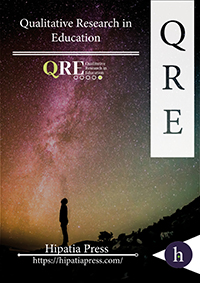Question Asking and the Common Good: A Hermeneutic Investigation of Student Questioning in Moral Configurations of Classroom Practice
Keywords:
Downloads
Abstract
This qualitative study (based on a hermeneutic moral-realist interpretive frame (Yanchar & Slife, 2017)) explored question asking as it unfolded in the everyday practice of being a student in a graduate course on design thinking (with an emphasis on design in education). Findings are presented as four key tensions that occurred within the complex classroom setting under investigation: “theory and overlapping practices,” “convergence and divergence,” “participation and reticence,” and “give and take.” Overall, these thematized tensions point to a dynamic interplay between student agency and the common good of the class. These findings have significant implications for understanding student questioning experiences and the study of classroom interactions.
Downloads
References
Addison, R. B. (1992). Grounded hermeneutic research. In B. F. Crabtree & W. L. Miller (Eds.), Doing
Google Scholar Crossrefqualitative research (pp. 110-125). Newbury Park, CA: Sage.
Google Scholar CrossrefBrinkmann, S. (2011). Psychology as a moral science: Perspectives on normativity. New York, NY: Springer.
Google Scholar CrossrefChin, C. & Brown, D. E. (2002). Student-generated questions: A meaningful aspect of learning in science. International Journal of Science Education, 24(5), 521–549.
Google Scholar CrossrefChin, C., & Osborne, J. (2008). Students’ questions: A potential resource for teaching and learning science. Studies in Science Education, 44(1), 1–39.
Google Scholar CrossrefDewey, J. (1971). How we think: A restatement of the relation of reflective thinking to the educative process (2nd rev. ed.). Chicago, IL: Henry Regnery.
Google Scholar CrossrefDillon, J. T. (1984). The classification of research questions. Review of Educational Research, 54(3), 327–361.
Google Scholar CrossrefDillon, J. T. (1988). The remedial status of student questioning. Journal of Curriculum Studies, 20(3), 197–210.
Google Scholar CrossrefEinstein, A. (1950). On the generalized theory of gravitation. Scientific American, 182(4), 13–17. doi:10.1038/scientificamerican0450-2
Google Scholar CrossrefFishbein, H. D., van Leeuwen, R., & Langmeyer, D. (1992). Teacher versus learner controlled instruction: Question-asking and comprehension. British Journal of Educational Psychology, 62(1), 126–131. doi:10.1111/j.2044-8279.1992.tb01005.x
Google Scholar CrossrefFleming, V., Gaidys, U., & Robb, Y. (2003). Hermeneutic research in nursing: Developing a Gadamerian-based research method. Nursing Inquiry, 10(2), 113-120.
Google Scholar CrossrefGadamer, H.-G. (1993). Truth and method (2nd, rev. ed.). (J. Weinsheimer & D. G. Marshall, Trans.). New York, NY: Continuum.
Google Scholar CrossrefGong, S. P. (2018). The moral realism of student question-asking in a graduate classroom. All Theses and Dissertations. 6888. https://scholarsarchive.byu.edu/etd/6888
Google Scholar CrossrefGraesser A. C., & McMahen C. L. (1993). Anomalous information triggers questions when adults solve quantitative problems and comprehend stories. Journal of Educational Psychology, 85(1), 136–151.
Google Scholar CrossrefHarper, K. A., Etkina, E., & Lin, Y. (2003). Encouraging and analyzing student questions in a large physics course: Meaningful patterns for instructors. Journal of Research in Science Teaching. 40(8), 776–91.
Google Scholar CrossrefKvale, S., & Brinkmann, S. (2009). InterViews: Learning the craft of qualitative research interviewing (2nd ed.). Thousand Oaks, CA: Sage.
Google Scholar CrossrefLehnert G. W. (1978). The Process of Question Answering. Lawrence Erlbaum Associates, Hillsdale, New Jersey.
Google Scholar CrossrefLincoln, Y. S., & Guba, E. G. (1985). Naturalistic inquiry (pp. 289-331). Newbury Park, CA: Sage Publications.
Google Scholar CrossrefLindfors, J. W. (1999). Children’s inquiry: Using language to make sense of the world. New York, NY: Teachers College Press.
Google Scholar CrossrefMacIntyre, A. (1984). After virtue (2nd ed.). Notre Dame, IN: Notre Dame University Press.
Google Scholar CrossrefOtero, J., & Graesser, A. C. (2001). PREG: Elements of a Model of Question Asking. Cognition and Instruction, 19(2), 143–175. Retrieved from http://www.jstor.org/stable/3233815
Google Scholar CrossrefPedrosa de Jesus, M. H., Almeida, P., & Watts, M. (2004). Questioning styles and students’ learning: Four case studies. Educational Psychology, 24(4), 531–548. doi:10.1080/0144341042000228889
Google Scholar CrossrefPostman, N., & Weingartner, C. (1969). Teaching as a subversive activity. New York, NY: Dell Publishing.
Google Scholar CrossrefRop, C. J. (2003). Spontaneous inquiry questions in high school chemistry classrooms: Perceptions of a group of motivated learners. International Journal of Science Education, 25(1), 13–33
Google Scholar CrossrefRosenshine, B., Meister, C. & Chapman, S. (1996). Teaching students to generate questions: A review of the intervention studies. Review of Educational Research, 66(2), 181–221.
Google Scholar CrossrefStigliano, A. (1990). The moral basis of human science. Saybrook Review, 8(1), 73-104.
Google Scholar CrossrefSusskind, E. (1969). The role of question asking in the elementary school classroom. In F. Kaplan & S. B. Sarason (Eds.), The Psycho-Educational Clinic (pp. 130–151). New Haven, CT: Yale University Press.
Google Scholar CrossrefTaylor, C. (1989). Sources of the self: The making of the modern identity. Cambridge, MA: Harvard University Press.
Google Scholar CrossrefTsui, A. (1992). A functional description of questions. In M. Coulthard (Ed.), Advances in spoken discourse analysis (pp. 89–110). London, England: Routledge.
Google Scholar CrossrefVan der Meij, H. (1988). Constraints on question asking in classrooms. Journal of Educational Psychology, 80(3), 401.
Google Scholar CrossrefVan der Meij, H. (1994). Student questioning: A componential analysis. Learning and Individual Differences, 6(2), 137–161.
Google Scholar Crossrefvan Zee, E. H. (2000). Analysis of a student-generated inquiry discussion. International Journal of Science Education, 22(2), 115–142.
Google Scholar CrossrefVarela, F. J., Thompson, E. T., & Rosch, E. (1991). The embodied mind: Cognitive science and human experience. Cambridge, MA: MIT Press.
Google Scholar CrossrefVolkman, M.J. (2004). Learning to teach physics through inquiry: The lived experience of a graduate teaching assistant. Journal of Research in Science Teaching. 41(6) 2004. https://doi.org/10.1002/tea.20017
Google Scholar CrossrefYanchar, S. C., & Slife, B. D. (2017). Theorizing inquiry in the moral space of practice. Qualitative Research
Google Scholar Crossrefin Psychology, 14 (2), 146-170.
Google Scholar CrossrefDownloads
Published
Almetric
Dimensions
How to Cite
Issue
Section
License
All articles are published under Creative Commons copyright (CC BY). Authors hold the copyright and retain publishing rights without restrictions, but authors allow anyone to download, reuse, reprint, modify, distribute, and/or copy articles as the original source is cited.















